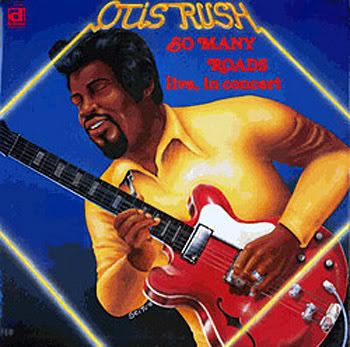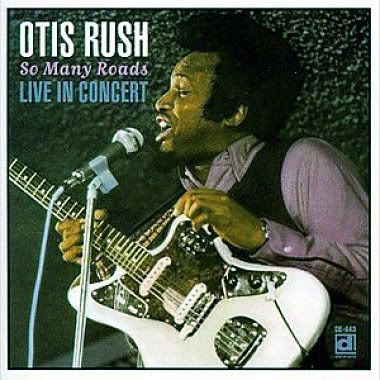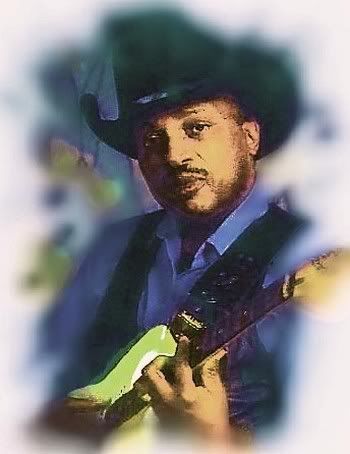
Otis Rush - So Many Roads Live In Concert - 1978 - Delmark
There's a pile of Otis Rush live albums in the bins now, but this was the one that made everybody sit up and take notice and it's still his best. Recorded live outdoors in a Tokyo park in the Summer of 1975 with thousands of fans hanging on every note and word, Otis digs deep and delivers some of the most inspired singing and playing he's ever comitted to magnetic tape. All the performances are of a nice, comfortable lenth with none of the interminable soloing that mars other Rush live sets. This is the one to have. © Cub Koda, allmusic.com
On this wonderful live album, the esteemed back up band complement Otis Rush perfectly, and he steals the show with his fluid skill on the fretboard and his intense passionate vocals. A great live album with terrific audience feedback. Check out Otis' brilliant "Any Place I'm Going" album, and the blues masterpiece, "Door to Door (With Albert King)", which showcases the two Bluesmasters at their brilliant best.
The 1995 Delmark CD 13 track release with 4 bonus * tracks is posted here with the following track / composer sequence -
1 Introduction - Rush, Otis [Bonus] *
2 Will My Woman Be Home Tonight (Blue Guitar) - Hooker, Earl
3 Every Day I Have the Blues - Memphis Slim
4 I Can't Quit You Baby - Dixon, Willie
5 Crosscut Saw - Ford, R.G.
6 Looking Back (Take A Look Behind) - Benton, Brook/Hendricks, Belford/Otis, Clyde
7 Chitlins con Carne - Burrell [Bonus] *
8 I've Got News for You - Alfred [Bonus] *
9 Mean Old World - Walker, Walker [Bonus] *
10 All Your Love (I Miss Loving) - Rush, Otis
11 So Many Roads, So Many Trains - Paul, Marshall
12 Gambler's Blues - King, Albert
13 Three Times a Fool - Rush, Otis
BAND
Otis Rush (vocals, guitar);
Jimmy Johnson (guitar);
Sylvester Boines (bass);
Tyrone Centuray (drums).
Recorded July 20 & 29, 1975 at Hibiya Park in Tokyo, Japan
Originally released on vinyl in 1978 on Delmark records with the following 9 tracks / composers -
1 Will My Woman Be Home Tonight - Hooker, Earl
2 Every Day I Have the Blues - Memphis Slim
3 I Can't Quit You Baby - Dixon, Willie
4 Crosscut Saw - Ford, R.G.
5 Looking Back[Take A Look Behind] - Benton, Brook/Hendricks, Belford/Otis, Clyde
6 All Your Love (I Miss Loving) - Rush, Otis
7 So Many Roads, So Many Trains - Paul, Marshall
8 Gambler's Blues - King, Albert
9 Three Times a Fool - Rush, Otis
REVIEW
The 1995 CD release of this title, complete with a bit more than an extra ten minutes of material, looks good on paper and received lots of praise. The original album release is among much live material by this artist that haunts the used-record pile, possibly because when blues fans begin culling through their collection, it is titles such as this that get the boot. Not that this is terrible or anything. Otis Rush is one of the finest blues guitarists, ever. He has made some records that are fantastic. On this one, he is in front of a huge live audience in Japan. The performance is reminiscent of some of the live albums by B.B. King. Backup is sparse in comparison, though. There are only drums and bass, plus second guitarist Jimmy Johnson, a capable player who is mixed pretty far to the background, sticking closely to chords or riff patterns. Blues purists will raise an eyebrow over the way the drummer and bassist play, ever mindful of the fact that Rush was a heavy guitarist who liked to stretch out and build intensity in his solos. His string-bending prowess never fails to surprise, and he also has other tricks for the fretboard, including feedback and ecstatic chording at the climax of an improvisation. Listeners familiar with the way bass and drums pursue a soloist in a fusion jazz band will have an inkling of the way bassist Sylvester Boines and drummer Tyrone Centuray attack the guitar happenings here. There are plenty of familiar gambits, such as suddenly doubling or even tripling the time at the turnaround, heavy-handed use of hi-hat splashes, and intense, synchronized accents that bring to mind the time the guy upstairs decided to demonstrate dance steps at three in the morning. "Crosscut Saw" is a version of this blues standard as if Rush had written it, every guitar lick delivered piping hot, fresh from the guitarist's bakery. It all adds up to showmanship and virtuosity, yes. What is missing is the really deep feeling of the blues. It just doesn't happen on this record. Deep as Rush's guitar burrows into one's soul, however, the listener might not even miss it. © Eugene Chadbourne, All Music Guide

SHORT BIO [ Source: The Encyclopedia of Popular Music by Colin Larkin. Licensed from Muze. ]
29 April 1934, Philadelphia, Mississippi, USA. A left-handed blues guitarist, Rush moved to Chicago where his impassioned singing and playing on "I Can't Quit You Baby" brought a Top 10 R&B hit in 1956. He became one of the "young turks" of the Chicago scene together with Buddy Guy, Freddie King and Magic Sam. "I Can't Quit You Baby" and other Cobra Records recordings ("Double Trouble", "All Your Love") from the same era inspired British guitarists such as Peter Green, Eric Clapton and Mick Taylor, who strived to recreate the starkly emotive quality of his solos. John Mayall opened the pivotal Blues Breakers With Eric Clapton with "All Your Love" and continued by making Rush more widely known in the UK with recordings of "So Many Roads", "I Can't Quit You Baby" (also recorded by Led Zeppelin) and "Double Trouble". In the early 60s, Rush recorded for Chess Records and Duke where "So Many Roads" and "Homework" became his best-known songs. As blues declined in popularity with black audiences, he turned increasingly to college concerts and collaborations with white blues artists such as Mike Bloomfield, with whom he made an album for Cotillion in 1969. During the 70s, Rush toured Europe and Japan, recording in Sweden, France and Japan as well as making two albums for Chicago-based label Delmark Records. Right Place, Wrong Time had been made in 1971 for Capitol Records with producer Nick Gravenites, but was only issue five years later. Rush performed and toured less frequently in the 80s, although an album made at the 1985 San Francisco Blues Festival showed him to be on top form. Rush's influence has always been greater than his commercial standing and like Buddy Guy, his former stablemate at Chess, he has become a guitarist's guitarist. In the blues boom of the early 90s Rush was tagged to benefit in a similar way to John Lee Hooker and Buddy Guy. John Porter, the producer of Guy's excellent Damn Right, I've Got the Blues, was enlisted to work on 1994's Ain't Enough Comin' In. On this, his best work for many a year, Rush demonstrated total confidence and experience and was well supported by Mick Weaver (organ), Bill Payne (piano) and Greg Rzab (bass). The 1998 studio follow-up Any Place I'm Going, recorded for new label House Of Blues, continued the good run with some excellent brass backing adding a thick layer to Rush's blend of soul and blues.

BIO
Breaking into the R&B Top Ten his very first time out in 1956 with the startlingly intense slow blues "I Can't Quit You Baby," southpaw guitarist Otis Rush subsequently established himself as one of the premier bluesmen on the Chicago circuit. He remains so today. Rush is often credited with being one of the architects of the West side guitar style, along with Magic Sam and Buddy Guy. It's a nebulous honor, since Otis Rush played clubs on Chicago's South side just as frequently during the sound's late-'50s incubation period. Nevertheless, his esteemed status as a prime Chicago innovator is eternally assured by the ringing, vibrato-enhanced guitar work that remains his stock-in-trade and a tortured, super-intense vocal delivery that can force the hairs on the back of your neck upwards in silent salute. If talent alone were the formula for widespread success, Rush would currently be Chicago's leading blues artist. But fate, luck, and the guitarist's own idiosyncrasies have conspired to hold him back on several occasions when opportunity was virtually begging to be accepted. Rush came to Chicago in 1948, met Muddy Waters, and knew instantly what he wanted to do with the rest of his life. The omnipresent Willie Dixon caught Rush's act and signed him to Eli Toscano's Cobra Records in 1956. The frighteningly intense "I Can't Quit You Baby" was the maiden effort for both artist and label, streaking to number six on Billboard's R&B chart. His 1956-58 Cobra legacy is a magnificent one, distinguished by the Dixon-produced minor-key masterpieces "Double Trouble" and "My Love Will Never Die," the nails-tough "Three Times a Fool" and "Keep on Loving Me Baby," and the rhumba-rocking classic "All Your Love (I Miss Loving)." Rush apparently dashed off the latter tune in the car en route to Cobra's West Roosevelt Road studios, where he would cut it with the nucleus of Ike Turner's combo. After Cobra closed up shop, Rush's recording fortunes mostly floundered. He followed Dixon over to Chess in 1960, cutting another classic (the stunning "So Many Roads, So Many Trains") before moving on to Duke (one solitary single, 1962's "Homework"), Vanguard, and Cotillion (there he cut the underrated Mike Bloomfield-Nick Gravenites-produced 1969 album Mourning in the Morning, with yeoman help from the house rhythm section in Muscle Shoals). Typical of Rush's horrendous luck was the unnerving saga of his Right Place, Wrong Time album. Laid down in 1971 for Capitol Records, the giant label inexplicably took a pass on the project despite its obvious excellence. It took another five years for the set to emerge on the tiny Bullfrog label, blunting Rush's momentum once again (the album is now available on HighTone). An uneven but worthwhile 1975 set for Delmark, Cold Day in Hell, and a host of solid live albums that mostly sound very similar kept Rush's gilt-edged name in the marketplace to some extent during the 1970s and '80s, a troubling period for the legendary southpaw. In 1986, he walked out on an expensive session for Rooster Blues (Louis Myers, Lucky Peterson, and Casey Jones were among the assembled sidemen), complaining that his amplifier didn't sound right and thereby scuttling the entire project. Alligator picked up the rights to an album he had done overseas for Sonet originally called Troubles, Troubles. It turned out to be a prophetic title: much to Rush's chagrin, the firm overdubbed keyboardist Lucky Peterson and chopped out some masterful guitar work when it reissued the set as Lost in the Blues in 1991. Finally, in 1994, the career of this Chicago blues legend began traveling in the right direction. Ain't Enough Comin' In, his first studio album in 16 years, was released on Mercury and ended up topping many blues critics' year-end lists. Produced spotlessly by John Porter with a skin-tight band, Rush roared a set of nothing but covers — but did them all his way, his blistering guitar consistently to the fore. Once again, a series of personal problems threatened to end Rush's long-overdue return to national prominence before it got off the ground. But he's been in top-notch form in recent years, fronting a tight band that's entirely sympathetic to the guitarist's sizzling approach. Rush signed with the House of Blues' fledgling record label, instantly granting that company a large dose of credibility and setting himself up for another career push. It still may not be too late for Otis Rush to assume his rightful throne as Chicago's blues king. © Bill Dahl, allmusic.com





5 comments:
LINK Pt 1
LINK Pt 2
Thanks very much for sharing. Great blog!
Hey, Monte. Thans a million, & keep in touch!
Outstanding album! Thanks for sharing!
Howzitgoin?, pbeagan. Thanks. Great to see appreciation of the great man's work. Keep the blues alive! TTU soon
Post a Comment